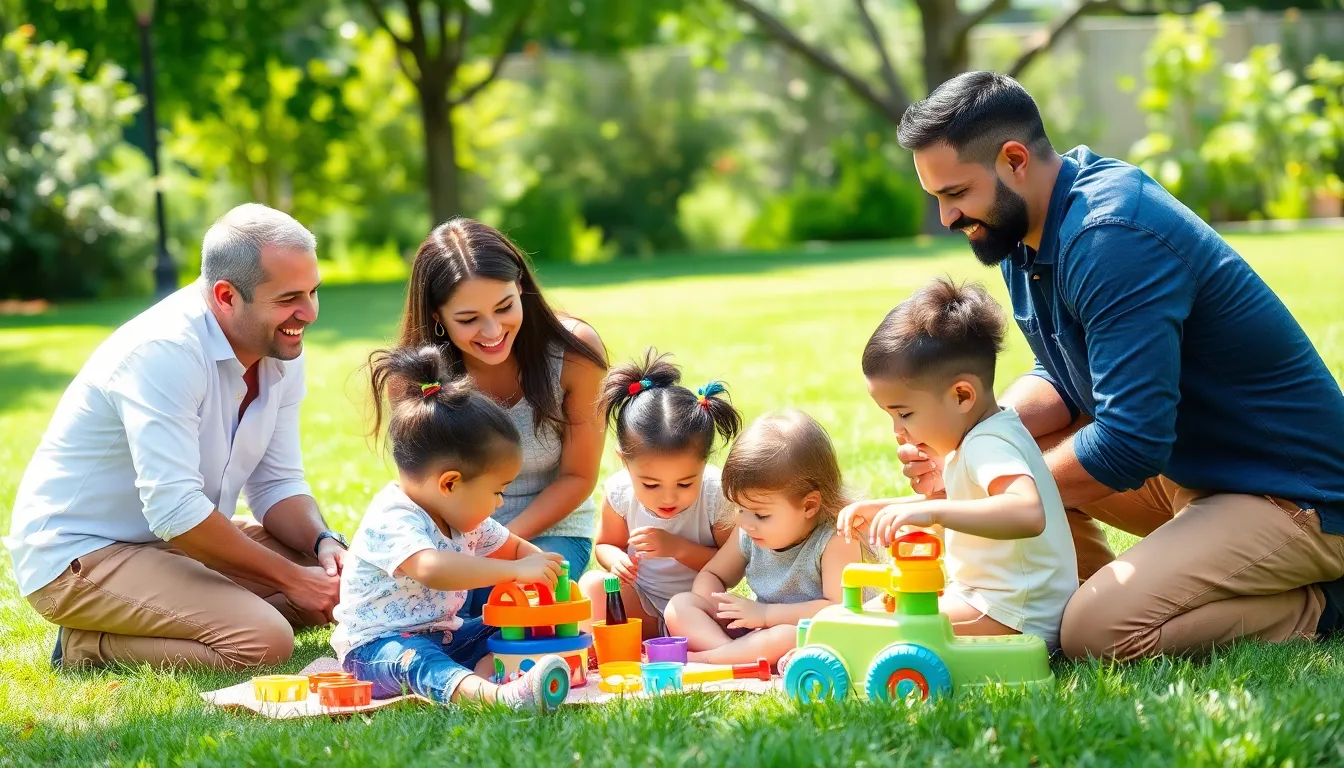Table of Contents
ToggleIn a world where parenting feels like juggling flaming swords while riding a unicycle, modern parents are navigating uncharted territory. Gone are the days of simple rules and predictable routines. Today’s parents face a whirlwind of technology, social media, and ever-evolving parenting philosophies that can leave anyone feeling like they’re in a sitcom with no script.
Understanding Modern Parenting
Modern parenting encompasses the evolving methods, tools, and philosophies shaping how parents raise their children. It responds to the complexities of contemporary life and the unique challenges families face today.
Defining Modern Parenting
Modern parenting focuses on nurturing a child’s emotional, social, and intellectual development. It incorporates technology as a tool for education while also fostering strong communication and connection. Families prioritize flexibility, adapting to individual needs rather than adhering to one-size-fits-all approaches. This definition highlights how parents strive to balance involvement with independence.
Key Characteristics of Modern Parenting
Key characteristics of modern parenting include an emphasis on open dialogue, collaboration, and emotional intelligence. Parents often engage in active listening, making children feel valued and understood. Technology integration allows for accessible information and support networks. Parents increasingly prioritize mental health awareness, recognizing its impact on both their well-being and their child’s. Encouraging independence while maintaining guidance defines the modern approach, ensuring children thrive in various environments.
Challenges of Modern Parenting

Modern parents face numerous challenges. These hurdles often stem from the complexities of their daily lives.
Balancing Work and Family Life
Balancing work and family life presents a significant challenge. Parents juggle professional responsibilities while ensuring they spend quality time with children. The rise of remote work alters traditional boundaries, making it difficult to separate work hours from family time. Many parents struggle to maintain their own well-being amid these demands. Stress can build as they navigate deadlines and family obligations. Prioritizing tasks becomes essential. Parents often rely on planning tools and schedules to create harmony in their lives. Flexibility plays a crucial role in making adjustments when unexpected events arise. Mothers and fathers seek partnerships with their children, fostering understanding in managing daily responsibilities together.
Navigating Technology and Screen Time
Navigating technology and screen time poses another challenge for modern parents. Children encounter screens at a young age, making it vital for parents to set boundaries. Communication about appropriate usage becomes essential in fostering responsible habits. Educating kids on digital literacy is equally important. Parents can utilize educational apps and websites that promote learning. Engaging with children during screen time builds stronger connections and encourages collaboration. Discussions about online safety provide necessary tools for protecting against digital threats. Monitoring usage without infringing on independence fosters healthy relationships with technology. Striking a balance between digital interaction and other activities is crucial in ensuring a well-rounded upbringing for children.
Parenting Styles in the Modern Era
Parenting styles significantly shape child development in today’s environment. Understanding the differences among these styles helps parents navigate their approaches effectively.
Authoritative vs. Permissive Parenting
Authoritative parenting combines structure and support, emphasizing rules while encouraging independence. Parents in this style foster communication and mutual respect, allowing children to express their opinions. Research shows that children raised in authoritative households often exhibit higher self-esteem and better social skills. In contrast, permissive parenting leans towards leniency, prioritizing freedom over discipline. While this approach promotes creativity and self-expression, it can lead to behavioral issues and a lack of responsibility. Finding a balance between these two styles often proves beneficial for fostering well-rounded children.
The Role of Cultural Influences
Cultural influences significantly affect parenting styles and practices. Different cultures prioritize various values and behaviors, shaping parental expectations. For instance, collectivist cultures often emphasize family and community, while individualistic cultures value personal autonomy. Parents incorporate cultural beliefs into their methods, impacting everything from discipline to education. Additionally, globalization introduces cross-cultural elements, influencing modern parenting approaches. Adaptability remains key as parents blend traditional values with contemporary trends, creating environments that resonate with their unique family dynamics.
The Impact of Social Media on Parenting
Social media significantly influences modern parenting, offering both opportunities and challenges.
Sharing Parenting Journeys Online
Parents often share their experiences online, creating communities built around support and advice. They connect through platforms like Instagram and Facebook, exchanging tips on everything from sleep training to meal preparations. Sharing successes encourages other parents to embrace their unique journeys, fostering a sense of belonging. However, oversharing can lead to privacy concerns and unrealistic portrayals of parenting. Balancing openness with discretion proves essential in navigating these digital spaces. Engaging in constructive discussions builds a mutual understanding among parents, reinforcing the importance of community.
The Pressure of Perfectionism
Social media amplifies the pressure many parents feel to achieve perfection. It showcases curated snapshots of family life that often seem unattainable. Parents may compare themselves to others, leading to feelings of inadequacy and anxiety. This constant comparison can detract from genuine parenting experiences and diminish self-esteem. Recognizing that no family is perfect can provide relief, allowing parents to embrace their imperfections. Cultivating a culture that values authenticity over perfection helps foster healthier comparisons. With a focus on connection, parents can support one another through the realities of daily life.
Modern parenting is a dynamic journey filled with unique challenges and opportunities. As parents navigate the complexities of today’s world they must adapt to evolving methods and philosophies that prioritize emotional and social development. By fostering open communication and balancing technology with real-life interactions parents can create nurturing environments that support their children’s growth.
The importance of mental health awareness and the blending of cultural influences further enrich the parenting landscape. Embracing imperfections and recognizing the value of authenticity can help parents build supportive communities. Ultimately modern parenting is about finding the right balance that allows children to thrive while fostering strong family connections.




